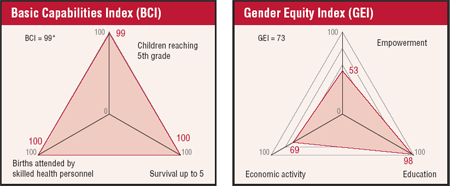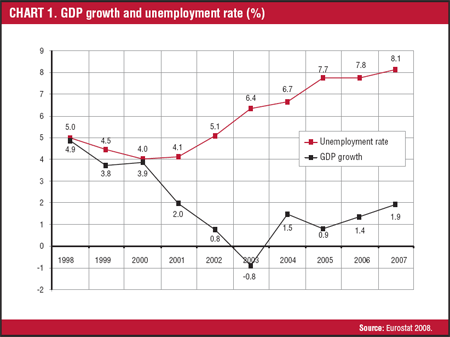An old crisis and fresh challenges
An old crisis and fresh challenges
Social Watch Portugal; Oikos
Catarina Cordas
João José Fernandes
The economic crisis that Portugal has been facing since at least 2001, reinforced by the current international financial and economic crisis, has brought increasing unemployment and poverty. The latter, however, is not just an effect of the current situation, but remains a structural condition. Almost half the population, including members of the middle class who lost their jobs and/or houses, experienced poverty between 1995 and 2000. Climate change is also affecting the economy and the well being of citizens. New approaches and specific measures are needed to combat poverty and tackle environmental challenges.
* |
According to the Spring 2009 Financial Bulletin of the Bank of Portugal (BdP),1 the Portuguese economy began to slow down appreciably in early 2008 and then, starting in the second quarter, went into the most profound recessive period in decades. The Bulletin states that the economy will experience a 3.5% decline in 2009, the worst performance since 1975. This slowdown reveals that the sluggish productivity has had an impact on unemployment rates, which went up to 8% in January 2009 compared to 7.7% in January 2008. At the end of February 2009 almost 500,000 unemployed people (5% of the population) had registered at employment centres.
Credit, housing and poverty risk
Lack of access to credit is another very negative consequence of the international economic crisis. Although there are no official data regarding this, many families lost their houses due to non-payment of loan instalments in 2008. According to the 2007 EU Survey on Income and Living Conditions (EU-SILC), non-monetary income components such as home ownership contribute to softening the incidence and intensity of poverty.2 Housing losses – or increasing acquisition problems among the middle or lower classes – and job losses have increased the risk of poverty, defined by the EU-SILC as the share of adult inhabitants with an annual income in 2006 below EUR 4,544 (approximately EUR 379 per month).
According to the EU-SILC, the risk of poverty for unemployed Portuguese was 32% in 2006, slightly more than in 2005 (31%). This increase is predictable due to the increased unemployment mentioned above. Overall, however, the poverty risk went down to 18%, a reduction of approximately 5% from 1994 when it was 23%. The improvement reflected the positive effects of European programmes since 1989 to combat poverty and the National Action Plan for Inclusion 2003-2005,3 which had some very positive guiding principles:
 |
- A multidimensional and multidisciplinary approach to poverty and deprivation;
- An emphasis on partnerships between public and private actors;
- Participation of all interested parties, especially the poor;
- Empowerment of the poor; and
- Mainstreaming policies and actions to generate awareness in each sector-based policy and prevent the fight against poverty being reduced to a peripheral programme.
The EU-SILC showed that 47% of families had experienced poverty between 1995 and 2000, with 72% remaining poor for two or more years.4 Many of these are the new poor, men and women who had recently belonged in the middle class but who became impoverished due to a family crisis such as the loss of a job or increased interest rates on housing loans or mortgages. At the beginning of 2009, NGOs highlighted some dramatic stories of people who had seen their lives changed radically and become dependent on the help of third parties. The President of the European Anti Poverty Network has said that, of the 2 million poor in Portugal, 17% are currently employed but their salaries do not cover their daily needs.5 Poverty is increasing in the big cities and has led to several recent suicide attempts.
Addressing poverty
These findings suggest that the problem “is not what we are doing, but what is still to be done”.6 A transfer of approximately 3.5% of the income from those who are not poor would be enough to meet the needs of those who are.7
Poverty in Portugal – as elsewhere – will not be solved merely by social policies, although these are also important. There is a need for economic policies that deal with the unequal distribution of income, property and power. Economists and civil society organizations increasingly point out that inequality in assets leads to economic inefficiency, and that there should be more investment in human capital (skills, education, health, training), which would also promote human rights. Only in this way will Portugal overcome the weaknesses that have so long hindered its productivity, condemning it to one of the lowest economic growth rates in Europe.
Three key recommendations to fight poverty are:
- Protection of the population that is highly vulnerable to poverty when defining social policies.
- Integrating economic policies into the fight against poverty, namely in terms of employment opportunities and institutionalization of bank credit, specifically concerning housing.
- Criteria that guarantee the General State Budget (GSB) works for social cohesion. Some organizations, such as Oikos, have suggested that a group should be created under the auspices of the Assembly of the Republic to monitor the GSB. It should have representation from civil society, scholars and policymakers, and use the following criteria: gender sensitivity, childhood rights, elderly rights, promotion of human capital and territorial consistency.
Impacts of climate change
A comprehensive study on the impact of climate change in Portugal, the SIAM II,8 suggests that the most significant effects of global warming are: important erosion of the coastline, increasing frequency of extreme weather events (such as prolonged droughts and sudden floods), reduction of rainfall (by 30%–40%) and increasing average annual temperature. While not catastrophic, consequences of climate change in the country will entail losses between 5%–10% of GDP. There are potential impacts on water resources, coastal zones, fisheries, agriculture, forests, biodiversity, energy, human health, and important sectors of the national economy such as tourism.
Given the inevitability of global climate change, it is becoming increasingly clear that policies for mitigation and adaptation must be strengthened. Regarding mitigation, there is a need to reduce CO2 emissions, improve energy efficiency, emphasize the reutilization and recycling of products, review transport and mobility policies, and focus on clean and renewable energy. The country should also develop mechanisms to use a significant part of the resources of the Portuguese Carbon Fund projects to achieve a double benefit: offsetting carbon emissions/energy efficiency; and combating poverty, particularly in developing countries.
Regarding adaptation it will be required, among other measures, to invest in protecting the coastline and water resources, to favour investment on crops more resilient to climate change, and increase the energy efficiency in public and residential buildings.
1 See: <www.bportugal.pt/publish/bolecon/primavera_09/econ_port_primavera09_p.pdf>.
2 National Statistics Institute (INE). “Dia Internacional de Erradicação da Pobreza.” Destaque, 15 October 2007. Available from: <www.ine.pt/ngt_server/attachfileu.jsp?look_parentBoui=8046108&att_display=n&att_download=y>.
3 See: <www.pnai.pt/>.
4 Costa, A., Baptista, I., Perista P. and Carrilho, P. Um olhar sobre a pobreza – vulnerabilidades e exclusão social no Portugal contemporâneo. Lisbon: Gradiva. 2008.
5 See Rede Europeia Anti Pobreza at: <www.reapn.org/>.
6 Costa, A., Baptista, I., Perista P. and Carrilho, P., Op. Cit.
7 Ibid.
8 Santos, F. D. and Miranda, P. Alterações Climáticas em Portugal. Lisbon: Gradiva, 2006.


